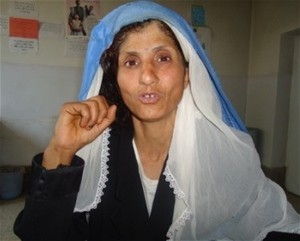
Madina is a community health worker in the village of Istalef. She travels from house to house three days a week to provide prenatal care and family planning advice to women.
Marzila Mashal
More than 21,000 community health workers provide better access to health services for rural families in Afghanistan.
23 SEPTEMBER 2010 | ISTALEF, KABUL PROVINCE, AFGHANISTAN
Having sufficient and qualified health care workers to address the pressing health care needs of women and children in rural communities across Afghanistan is an enormous challenge. Cultural barriers make it hard for women to leave their homes and travel to seek the health care they need. With 85 percent of the population living in villages, there are few options to provide proper care and advice to these rural families. However, one of them seems to be working very well: community health workers (CHWs).
In 2010 alone, the Afghan Ministry of Public Health (MoPH), with support from USAID, trained approximately 700 CHWs to educate families about proper sanitation and hygiene. CHWs also provide basic health care services and refer patients to health facilities after checking for danger signs in sick children and pregnant women. Since roughly half of the CHWs are women, the CHW program also promotes women’s empowerment. This gender balance is in itself a tremendous accomplishment for Afghanistan where, for years, women had few options for proper health care.
Madina, a widow who lost four of her eleven children during the Taliban years, found new meaning to her life after becoming a CHW. She received training and a trunk full of essential medicines from the MoPH. She now works under the supervision of the Comprehensive Health Center in Istalef, a small village north of Kabul. “I come to the health center to help my community provide essential services, to educate in areas where there is no nearby health facility, and provide prenatal care and family planning advice,” she explained. “I started my work five years ago as a community health worker after my 14-year-old daughter was sick and her husband didn’t let her go to the hospital to deliver her baby. Now, I try to raise people’s awareness about prenatal care, family planning, and serious health problems for mothers and infants.”
With support from USAID, the National Program of Community Based Health Care (CBHC) has mobilized more than 21,700 CHWs who, like Madina, provide basic health education, services, and referrals. The Ministry of Public Health’s CBHC program is a significant step towards improving access to health care for rural communities, especially for women and children.







Comment
Make a general inquiry or suggest an improvement.